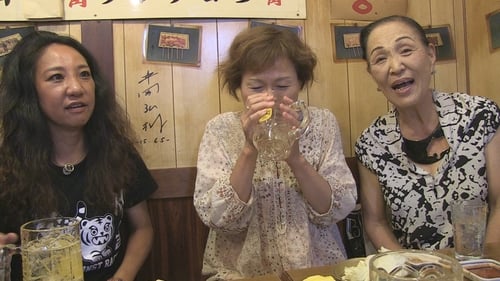Discrimination (2023)
Gênero : Documentário
Runtime : 1H 24M
Director : Kim Ji-woon, Kim Do-hee
Sinopse
Since 2013, Japan has implemented the free high school policy. However, only 10 Chongryon Korean high schools are excluded from this policy. The reason is that there are suspicions that the grant for free education will be misused by Chochongryon and others. Five of these schools protested about this measure and filed a claim for damages against the government in 2013. After four years of hearings, the first trial decision was made on July 19, 2017, starting with the case of Hiroshima Chongryon Korean high school.
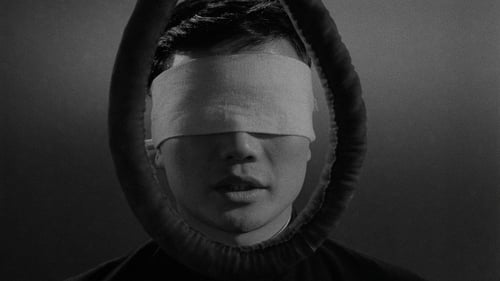
A Korean man is sentenced to death in Japan but survives his execution, sending the authorities into a panic about what to do next.

Ao Chong is the first feature film directed by Lee Sang-Il about Korean high school students growing up in Japan.

In 1948, after the Japan’s defeat, the General Headquarters and Japanese government ordered that the Chosen gakko, schools for Koreans in Japan,ō be shut down. Koreans in Osaka strongly resisted, and 16-year-old Kim Taeil was even shot and killed by the police. This was the Hanshin Education Incident. 70 years have passed, but the Japanese oppression continues. They've removed the Chosen gakkoō from being eligible for free education. Gaining strength from the growing hatred from the conservatives, the Abe administration is misusing the educational issue as a means to cause political strife. In the midst of ongoing conflicts in Japan, nonfiction writer KO Chanyu has directed Korean Schools in Japan, compiling a history of the Koreans' fight for education.
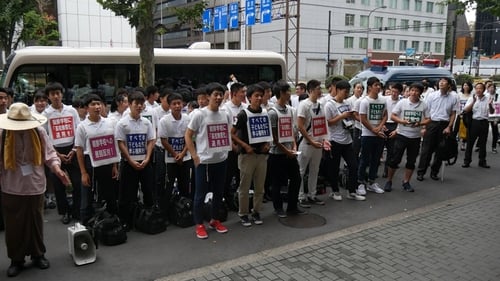
After 15 years of knowing Chosun people in Japan I met on Mt. Geumgang in 2002, I face the history of colonization and division that I had not known before. They’ve been to North Korea many times, but never to South Korea. They tell us why they want to live as Chosun people despite the discrimination in Japanese society.

In Kawasaki, Japan, 1st to 3rd generation of Korean-Japanese and Americans share their daily lives and wish for a symbiotic society. The inter-Korean summit in 2000 brought reconciliation and hope to the divided Korean community. Meanwhile, hundreds of hateful demonstrators are approaching Sakuramoto, the Korean residence, amid deepening tensions between Japan and Korea in 2016.
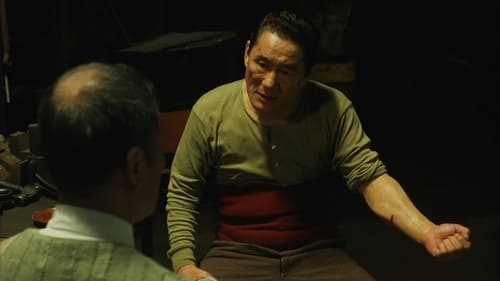
Em 1923 Kim Shun-Pei vai da Coreia do Sul para o Japão em busca de melhores condições de trabalho. Uma vida de muito trabalho pesado e discriminação tornam Kim um homem frio e violento, fazendo da vida de sua esposa e filhos um grande sofrimento.
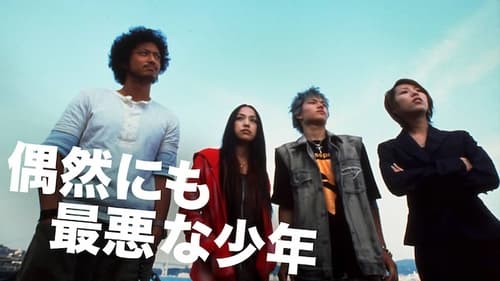
He can't control himself inside of him. Hidenori, a Japanese-Korean, hasn't seen his family in a few years. He doesn't want to go to school but just wander the streets. He always grins at a trifle. When he is caught stealing and he feels pain as his finger is cut off, he just smiles. He murmurs "Should I commit suicide?" in front of his dead sister. Yumi, an obsessive-compulsive girl, has a sticky finger. A boy who wanders the Sybuya. They join Hidenori's reckless plan by chance. They plan to stow away in order to show Korea to his sister, who has never seen the motherland. Three people who are out of this world and the dead go toward Hakata.
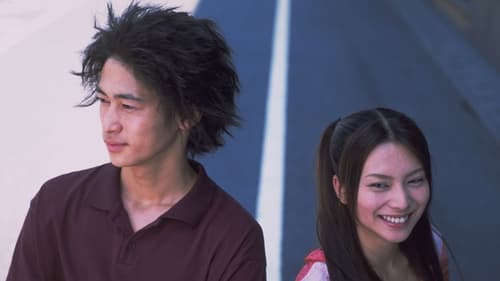
Sugihara, nascido no Japão, mas filho de pais norte-coreanos, se apaixona por uma garota japonesa depois de mudar de uma escola norte-coreana para uma escola japonesa. Seu pai boxeador lhe ensina boxe - habilidades muito utilizadas.
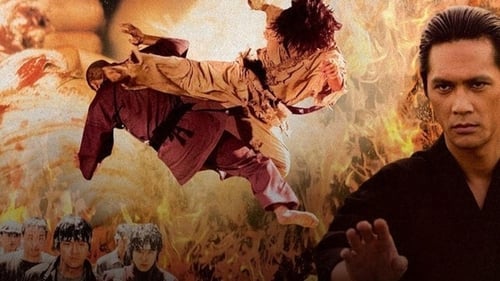
Choi Baedel Yang Donggeun é um jovem coreano que perto do final da Segunda Grande Guerra, chega ao Japão com o desejo de ser um piloto de caça. Porém, a descriminação e o final da guerra, colocam um ponto final em seus sonhos, e assim, acaba nas ruas com seus amigos imigrantes coreanos, todos tentando sobreviver. Após ser humilhado e desonrado pela Yakusa e por Kato (Kato Masaya), um oficial do exército japonês e mestre do Karatê, Choi é socorrido por Bumsoo (Jeong Duhong), um velho amigo e mentor que lhe apresenta os ensinamentos do Karatê japonês.
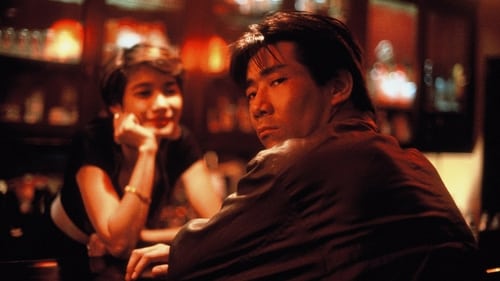
A Korean taxi-driver interacts both humorously and tragically with his customers and employers in '90s Tokyo.
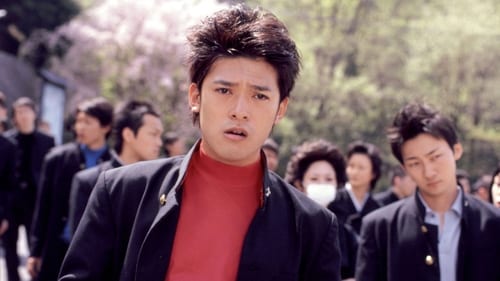
Romeo, A.K.A. Kosuke Matsuyama, is a second-year high school student. A nice, normal, nonviolent type, he suddenly finds himself in the middle of a rampaging crowd of Korean boys, outraged by insults perpetrated by several of his idiotic class-mates on two Korean girls. He makes a narrow escape, but soon after, he and his best bud Yoshio are sent by their home-room teacher to invite the Korean students to a friendly soccer game as a way of restoring the peace.

Dear Pyongyang is a documentary film by Zainichi Korean director Yang Yong-hi (Korean: 양영희, Hanja: 梁英姬) about her own family. It was shot in Osaka Japan (Yang's hometown) and Pyongyang, North Korea, In the 1970s, Yang's father, an ardent communist and leader of the pro-North movement in Japan, sent his three sons from Japan to North Korea under a repatriation campaign sponsored by ethnic activist organisation and de facto North Korean embassy Chongryon; as the only daughter, Yang herself remained in Japan. However, as the economic situation in the North deteriorated, the brothers became increasingly dependent for survival on the care packages sent by their parents. The film shows Yang's visits to her brothers in Pyongyang, as well as conversations with her father about his ideological faith and his regrets over breaking up his family.

Osaka Korean High School has provided education for the past six decades to the children of pro-North Korean residents in Japan. This school is located only about 20 minutes away from Hanazono Stadium, the mecca of Japan’s high school rugby, but it was not until 1994, 18 years after the foundation of a rugby team at the high school, that the Japanese education ministry approved the team’s entry into the official league. Since then, the team has run in the national league as a representative of the Osaka area and been considered a front-runner ever since. The team has strong players and passionate supporters, but it faces difficulties just before winning the league.
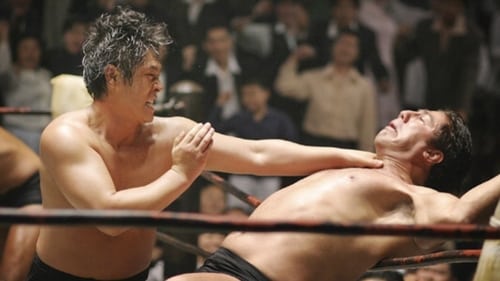
Story of Rikidozan, a sumo wrestler who can only achieve limited success in Japan because he's half Korean. But when Rikidozan goes to the United States and discovers professional wrestling, he becomes a hero back home.
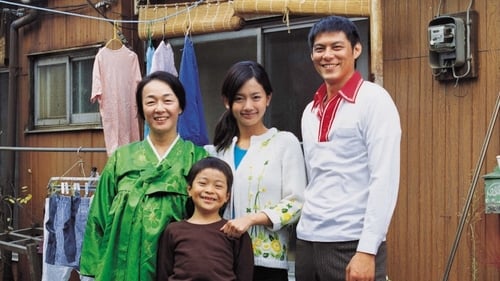
In 1974, during the height of the recession, a Japanese Korean family relocates to Tokyo to raise money and seek better treatment for their ill son.
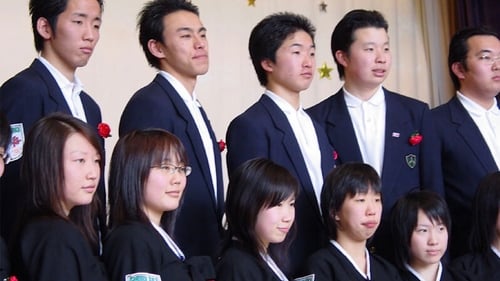
This documentary is about the 3rd and 4th generation Korean residents of Japan who are students of Chosen elementary, middle, and high school in Hokkaido. It follows the students through one year of the eventual 11 years` national education. Rather than focusing on special occasions or issues, it reveals what it is like to live in Japan as Korean-Japanese by describing their everyday lives.
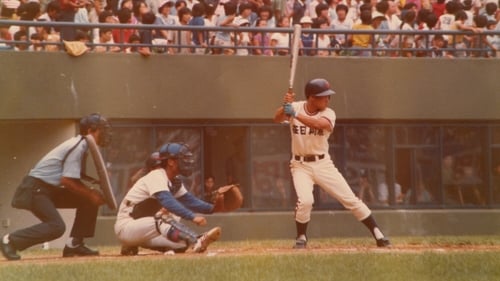
In April 2013, unfamiliar faces appear at the Jamsil Baseball Stadium during the opening matches between Doosan and SK. The nervous middle-aged men throwing and batting the first ball are, in fact, Korean-Japanese former team members that played on that same spot in the 1982 finals of the Bong-hwang-dae-ki games.

This is the true story of Kim Hee-ro and his fight for justice in Japan. On February 20, 1968, two Japanese gangsters were killed in a cabaret in Shizuoka, Japan. Kim Hee-개, a Korean resident of Japan, was accused of th crime. Kim held 13 people hostage in a nearby hotel, trying to have his story of constant intimidation and threats by the gangsters told, but eventually he was captured and sentenced to life imprisonment.

Set in the 1970's in the Kansai region of Japan.. Yong-Gil is Korean, but he moved to Japan and settled down. He runs a small restaurant named Yakiniku Dragon. He is married and has three daughters: oldest daughter Jung-Hwa, middle daughter Yi-Hwa and youngest daughter Mi-Hwa. Oldest daughter Jung-Hwa is dating Tetsuo, but they break up. Middle daughter Yi-Hwa loves Tetsuo and marries him, but Tetsuo still loves her older sister and they divorce. Youngest daughter Mi-Hwa wants to become a singer, but she is in love with a married man.





